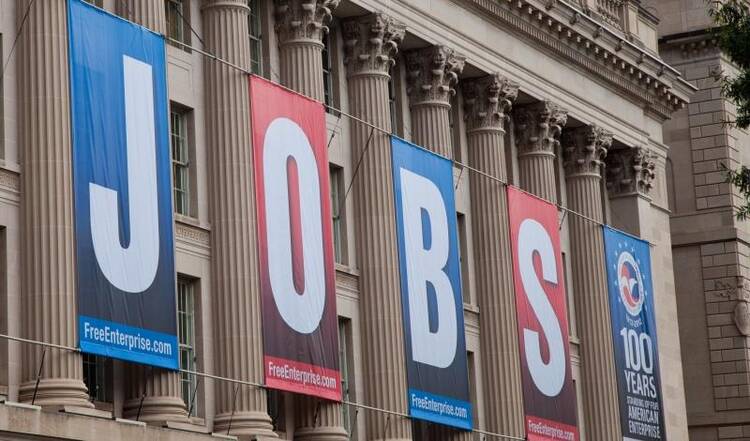The employment rate has long been the most popular measure of economic health—popular in the sense of being easily grasped by voters, as opposed to the gross domestic product. But in his State of the Union address, President Barack Obama gave it the back of his hand, and he signaled that economic security, not job creation, is going to be the primary selling point of the Democratic Party.
The Republicans, who like to portray themselves as the defenders of “job creators,” need to figure out how to appeal to Americans who have jobs but are still falling behind. The GOP’s most reliable voters do not work full-time—they’re retired—and have a disproportionate influence in midterm elections. They won’t be enough in a presidential year, and the Republican nominee will have to do more than preach the “dignity of work.”
In his speech, Obama did have some good job numbers to report, and he unloaded them right away: “Our economy is growing and creating jobs at the fastest pace since 1999. Our unemployment rate is now lower than it was before the financial crisis.” If his party still controlled Congress, he might have come under pressure to declare victory and leave well enough alone. With the Republican Party ascendant, he instead made the case that an honest wage isn’t always enough.
Obama tried to create a new political buzzphrase, “middle-class economics,” which he defined as “helping working families feel more secure in a world of constant change. That means helping folks afford childcare, college, health care, a home, retirement.” In addition to tax breaks and subsidies for these household costs, Obama called for action on mandated sick leave (“We’re the only advanced country on Earth that doesn’t guarantee paid sick leave or paid maternity leave to our workers”), enforcement of laws on overtime pay (“We still need to make sure employees get the overtime they’ve earned”) and an increase in the federal minimum wage (“To everyone in this Congress who still refuses to raise the minimum wage, I say this: If you truly believe you could work full-time and support a family on less than $15,000 a year, go try it.”)
Slate’s Jamelle Bouie called the speech has “a muscular defense of the [Democratic] party’s liberalism.” In his focus on helping families avoid financial setbacks—the kind triggered by illness or spiraling daycare costs or unexpected college fees—Obama was clearly influenced by party superstar Sen. Elizabeth Warren, who made her name researching the causes of household bankruptcy. But Hillary Clinton should have no problem embracing what are small policy potatoes compared with the Affordable Care Act.
Bouie calls the State of the Union list “a direct answer to the core question of the political moment: How can our government deliver the gains of economic growth to ordinary people?” For much of the 20th century, the Democratic Party made “full employment” one of its primary policy goals (the term was in party platforms from 1944 through 1988). But that was when a large share of the workforce belonged to labor unions, which fought against lay-offs and lobbied for such benefits as health insurance and sick days. Now the idea that you can achieve financial security by simply landing a job is as quaint as the notion of starting a college fund with a paper route.
The Republican Party may try to dismiss Obama’s “middle-class economics” as nothing more than prophylactics against financial risk. Instead of subsidizing child care for working parents, why not encourage more Americans to make money by starting their own businesses or investing in the stock market? Opportunity, not financial security, has long been the GOP brand.
But even Republicans are feeling pressure to save the middle class. In his rebuttal to the State of the Union address, likely GOP presidential candidate Rand Paul complained, “Income inequality has worsened under this administration. And tonight, President Obama offers more of the same policies—policies that have allowed the poor to get poorer and the rich to get richer.” Another presidential contender, tea party favorite Ted Cruz, told Fox News, “The top 1 percent earn a higher share of the national income than any year since 1928. The sad reality is that with big government, under the Obama administration, the rich and powerful…have gotten fat and happy.”
Rick Santorum, who ran for president in 2012 and is expected to try again, may have been ahead of this curve last March, when he groused about his own party, “That is the problem with Republicans. We talk about job creators all the time. It’s always job creators, job creators. It’s not about the job holder.”
This is not the kind of rhetoric that one associates with the U.S. Chamber of Commerce, or with stubbornly optimistic Ronald Reagan. Indeed, Obama’s proposals will probably go nowhere in the Republican-controlled Congress, which is no mood to, say, raise taxes on the top 1 percent to help make community colleges free for all.
In the official response to the State of the Union, Republican Sen. Joni Ernst ignored Obama’s proposals, instead calling for the approval of the Keystone Pipeline as a jobs measure. (Even the wildly optimistic estimate of 42,000 jobs would hardly register in an economy producing hundreds of thousands of new jobs each month.) Ernst’s big proposal, however, was a chestnut that appeals more to entrepreneurs than minimum-wage earners: “Let’s simplify America’s outdated and loophole-ridden tax code. Republicans think tax filing should be easier for you, not just the well-connected.”
Ironically, if the biggest worry of working families was how much time it takes to file taxes, Barack Obama’s approval ratings would be so high that Ernst probably wouldn’t have won her Senate seat last November.
Image from the U.S. Chamber of Commerce Foundation.








